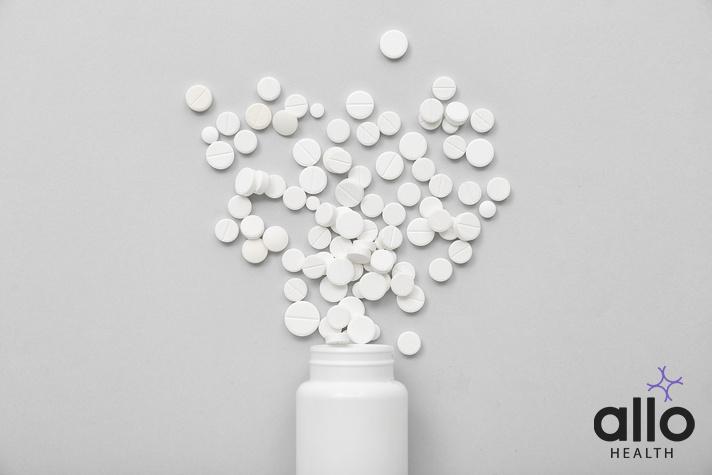Flibanserin For Women’s Health In India

Allo Health is dedicated to personalized well-being, offering support and trusted information tailored to individual health goals. The platform emphasizes human-generated content, led by a distinguished medical team of experts, including physicians and sexual health specialists. Their commitment to credibility involves rigorous fact-checking, authoritative research, and continuous updates to ensure accurate, up-to-date information. Allo Health's unique approach goes beyond conventional platforms, providing expert-led insights and a continuous commitment to excellence, with user feedback playing a crucial role in shaping the platform's authoritative voice.

Dr. Aditi completed her undergraduate medical education at AJIMS, Mangalore, after which she worked in multi-speciality hospitals with COVID patients and in the Pain and Palliative medicine department. Driven by her experiences, she developed a keen interest in psychiatry. Dr. Aditi believes that mental health is just as, if not more important, than physical health.
Why This Was Upated?
Our experts continually monitor the health and wellness space, and we update our articles when new information became available.
Updated on 18 January, 2024
- Article was updated as part of our commitment to diversity, equity, and inclusion.

"The following blog article provides information about a drug or brand name drug and its potential effects or benefits. However, it is crucial to understand that this information is intended for general educational purposes only and should not be considered a substitute for professional medical consultation. It is highly recommended to consult with a qualified healthcare professional before making any decisions regarding medication, treatment, or healthcare management.
Book consultation
Individuals have unique medical conditions, and the information provided in this article may not be applicable to everyone. Only a qualified healthcare provider can evaluate your specific medical situation, taking into account your medical history, conducting appropriate tests, and providing personalized advice and recommendations. They are equipped to make informed decisions tailored to your individual needs.
It is crucial to emphasize that self-diagnosis, self-medication, or disregarding medical advice can have serious health consequences. This article may reference specific brand names or drugs for illustrative purposes. Mention of these names does not imply endorsement, recommendation, or guarantee of their efficacy or safety. The choice of medication should be based on discussions and individualized guidance from a healthcare professional who has a comprehensive understanding of your medical condition.
"As women, we are often told that our health concerns don’t matter as much as those of men. For too long, few effective treatments have existed to address female sexual dysfunction, a condition that affects up to 43% of women in India. But now, a new medication has emerged that offers hope and a path forward for women’s health in the country: Flibanserin.
What Is Flibanserin?
Flibanserin is a medication that was developed to treat hypoactive sexual desire disorder (HSDD) in premenopausal women. HSDD is a condition characterized by a persistent and distressing lack of sexual desire or interest in sexual activity, leading to personal distress and relationship difficulties. Flibanserin is also known by its brand name, Addyi.
Here are some key details about Flibanserin:
- Mechanism of Action: Flibanserin works on the central nervous system, specifically targeting neurotransmitters in the brain. It is a serotonin receptor agonist and antagonist, which means it affects serotonin receptors. Unlike many other medications that work on sexual function, Flibanserin does not directly affect blood flow to the genital area but rather acts on brain chemistry.
- Approval: Flibanserin was approved by the U.S. Food and Drug Administration (FDA) in 2015 as the first medication for the treatment of HSDD in premenopausal women. Its approval was somewhat controversial, as it faced opposition from some who believed that the benefits were modest and the potential side effects concerning.
- Usage: Flibanserin is typically taken once daily at bedtime, and it should not be taken with alcohol due to the risk of severe low blood pressure and fainting. It may take several weeks of consistent use before improvements in sexual desire are noticed.
- Effectiveness: Flibanserin has been shown to increase the number of satisfying sexual events per month and improve sexual desire in some women with HSDD. However, its effects are modest, and it doesn’t work for everyone. The exact way it works in the brain is not fully understood.
- Side Effects: Flibanserin can have side effects, including dizziness, sleepiness, nausea, fatigue, and low blood pressure. Because of these side effects, it is often recommended that individuals avoid alcohol while taking the medication. Some people may experience a worsening of these side effects when alcohol is consumed.
- Safety Concerns: Flibanserin has come under scrutiny for its side effects and its limited effectiveness. It was initially rejected by the FDA due to concerns about its risk-benefit profile but was later approved with certain restrictions and a Risk Evaluation and Mitigation Strategy (REMS) program in place to manage potential risks.
- Patient Selection: Flibanserin is generally prescribed to premenopausal women who have been diagnosed with HSDD and for whom counseling and other non-pharmacological approaches have not been effective. It is not intended for use in postmenopausal women or men.
- Consultation with Healthcare Provider: If you or someone you know is considering Flibanserin, it’s essential to consult with a healthcare provider who can assess whether it is an appropriate treatment and provide guidance on its use, potential side effects, and risks.
Flibanserin represents one approach to addressing HSDD in women, but it’s important to note that it may not be a suitable or effective treatment for everyone, and non-pharmacological approaches and counseling should also be considered in the management of sexual desire disorders. Additionally, the medical landscape is constantly evolving, so it’s a good idea to consult with a healthcare provider for the most up-to-date information and treatment options.
Uses Of Flibanserin
Flibanserin, sold under the brand name Addyi, is primarily used for the treatment of hypoactive sexual desire disorder (HSDD) in premenopausal women. HSDD is a condition characterized by a persistent and distressing lack of sexual desire or interest in sexual activity, leading to personal distress and relationship difficulties. Here are the uses of Flibanserin in detail:
- Hypoactive Sexual Desire Disorder (HSDD): Flibanserin is specifically indicated for the treatment of HSDD in premenopausal women. It is prescribed when the following criteria are met:
- The woman has a diagnosis of acquired, generalized HSDD (meaning it is not due to a specific medical condition, medication, or relationship issues).
- The low sexual desire is causing distress in her life.
- Other potential causes of low sexual desire, such as medical or psychological factors, have been ruled out.
- Improvement in Sexual Desire: The primary purpose of Flibanserin is to increase sexual desire and the number of satisfying sexual events in women with HSDD. It aims to address the emotional and psychological factors contributing to low sexual desire.
- Non-Hormonal Treatment: Flibanserin is a non-hormonal medication. This is important because some other treatments for sexual dysfunction in women involve hormonal therapies, which may not be suitable for all women, especially those who have concerns about hormonal side effects.
- Patient Counseling and Education: In addition to medication, healthcare providers often emphasize the importance of counseling and education as part of the treatment plan for HSDD. Flibanserin may be used in conjunction with psychotherapy or counseling to address any underlying psychological or relationship issues contributing to the condition.
It’s important to note that Flibanserin is not intended for use in postmenopausal women or men. Its effectiveness varies from person to person, and it may not work for everyone. Additionally, Flibanserin should not be used for enhancing sexual performance or desire in individuals who do not have a diagnosed medical condition (HSDD) causing distress.
Before using Flibanserin or any other medication, individuals should consult with a healthcare provider who can assess their specific situation, provide guidance on its use, potential side effects, and risks, and consider alternative treatments or non-pharmacological approaches when appropriate.
Precautions Of Flibanserin
Flibanserin, sold under the brand name Addyi, is a medication used to treat hypoactive sexual desire disorder (HSDD) in premenopausal women. While it can be an effective treatment for some individuals, it comes with specific precautions and considerations that should be taken into account. Here are detailed precautions for the use of Flibanserin:
- Consultation with Healthcare Provider: Before starting Flibanserin, it’s crucial to have a thorough discussion with a healthcare provider. They will assess whether Flibanserin is an appropriate treatment based on your medical history, current medications, and the severity of your HSDD. Your healthcare provider can also discuss potential risks and benefits.
- Alcohol Avoidance: One of the most significant precautions with Flibanserin is the avoidance of alcohol while taking the medication. Flibanserin can lower blood pressure and cause dizziness and fainting, and these effects can be exacerbated by alcohol. It’s strongly recommended not to consume alcohol while taking Flibanserin.
- Medication Interactions: Inform your healthcare provider about all the medications you are currently taking, including over-the-counter drugs and supplements. Some medications may interact with Flibanserin, potentially increasing the risk of side effects or reducing its effectiveness.
- Drowsiness and Sleepiness: Flibanserin can cause drowsiness and sleepiness, especially when taken with alcohol or certain medications. It’s important to be cautious when engaging in activities that require mental alertness, such as driving, while using Flibanserin.
- Orthostatic Hypotension: Flibanserin may cause a drop in blood pressure, particularly when standing up from a sitting or lying position. If you experience lightheadedness, dizziness, or fainting upon standing, it’s essential to rise slowly to minimize the risk of falls.
- Pregnancy and Breastfeeding: The safety and effectiveness of Flibanserin during pregnancy and breastfeeding have not been established. If you are pregnant, planning to become pregnant, or breastfeeding, discuss the potential risks and benefits of Flibanserin with your healthcare provider.
- Liver Function: Flibanserin is metabolized in the liver, so individuals with liver impairment or certain liver conditions may be at higher risk for adverse effects. Your healthcare provider may monitor your liver function while you are taking Flibanserin.
- Side Effects: Be aware of potential side effects, which can include dizziness, nausea, fatigue, and insomnia. If you experience any severe or persistent side effects, contact your healthcare provider.
- Effectiveness: Flibanserin may not work for everyone, and its effectiveness can vary from person to person. It may take several weeks of consistent use before improvements in sexual desire are noticed, if at all.
- Regular Follow-Up: Regularly follow up with your healthcare provider to assess the effectiveness of Flibanserin and monitor for any side effects or changes in your condition.
Remember that Flibanserin is specifically approved for the treatment of HSDD in premenopausal women who meet certain criteria. It should not be used for recreational purposes or in individuals who do not have a diagnosed medical condition causing distress. Always follow your healthcare provider’s instructions and recommendations when using Flibanserin or any prescription medication.

Side Effects Of Flibanserin
Flibanserin, marketed under the brand name Addyi, is a medication prescribed to treat hypoactive sexual desire disorder (HSDD) in premenopausal women. Like any medication, Flibanserin can cause side effects. Here are some of the potential side effects of Flibanserin in detail:
Common Side Effects:
- Dizziness: Dizziness is one of the most common side effects of Flibanserin. It can occur when standing up too quickly or during activities that require alertness. To minimize this, it’s advised to rise slowly from a sitting or lying position.
- Sleepiness and Fatigue: Many individuals may experience sleepiness or fatigue while taking Flibanserin. This can impair daytime functioning and may be more pronounced when the medication is taken with alcohol or other sedative substances.
- Nausea: Nausea is another common side effect of Flibanserin. It can range from mild to moderate in intensity. Taking the medication with food may help reduce the likelihood of experiencing nausea.
- Insomnia: Some individuals may have difficulty falling asleep or staying asleep while taking Flibanserin. If insomnia occurs, it’s essential to discuss it with your healthcare provider to explore potential solutions.
Less Common Side Effects:
- Dry Mouth: Dry mouth is reported less frequently but can still occur while taking Flibanserin. Staying hydrated and using sugar-free lozenges or gum may help alleviate this symptom.
- Low Blood Pressure (Hypotension): Flibanserin can lead to a drop in blood pressure, especially when taken with alcohol or medications that affect blood pressure. This can result in lightheadedness or fainting, particularly when standing up quickly.
- Abdominal Pain: Abdominal pain or discomfort has been reported as a less common side effect. If it becomes severe or persistent, consult your healthcare provider.
- Anxiety: While Flibanserin is intended to address low sexual desire and related distress, some individuals may experience increased anxiety as a side effect. If this occurs, it should be discussed with a healthcare provider.
- Weight Gain: Weight gain has been reported in some individuals taking Flibanserin. It’s essential to monitor any changes in weight and discuss them with your healthcare provider if they are a concern.
- Headache: Headaches can occasionally occur as a side effect of Flibanserin.
It’s important to note that not everyone will experience these side effects, and their severity can vary from person to person. Additionally, some side effects may diminish or resolve with continued use of the medication.
If you experience any severe or persistent side effects, it’s crucial to contact your healthcare provider. They can assess whether the benefits of Flibanserin outweigh the potential risks in your specific case and may adjust your treatment plan accordingly.
Remember that Flibanserin should only be taken under the supervision of a qualified healthcare provider, and it should not be used in combination with alcohol or certain other medications that can increase the risk of side effects. Always follow your healthcare provider’s recommendations for the safe and appropriate use of Flibanserin.
Frequently Asked Questions
(1) What is Flibanserin, and what is its primary use in India?
Flibanserin is a medication used in India to treat hypoactive sexual desire disorder (HSDD) in premenopausal women. HSDD is characterized by a persistent lack of sexual desire causing distress. Flibanserin is specifically designed to address this condition by modulating brain chemistry to enhance sexual desire.
(2) Is Flibanserin available over-the-counter (OTC) in India?
No, Flibanserin is not available over-the-counter in India. It is a prescription medication, which means it can only be obtained with a valid prescription from a licensed healthcare provider. It’s essential to consult a healthcare professional who can evaluate your condition and determine if Flibanserin is an appropriate treatment option.
(3) How does Flibanserin work to increase sexual desire in women?
Flibanserin’s mechanism of action involves influencing neurotransmitters in the brain, particularly serotonin receptors. By targeting these receptors, Flibanserin helps restore the balance of certain brain chemicals, which, in turn, can enhance sexual desire in women with HSDD.
(4) Are there any restrictions on who can use Flibanserin in India?
Yes, there are specific criteria for prescribing Flibanserin in India. It is typically recommended for premenopausal women diagnosed with HSDD, provided that other potential causes of low sexual desire have been ruled out. Flibanserin is not intended for use in postmenopausal women or men.
(5) What are the common side effects of Flibanserin in India?
Common side effects of Flibanserin may include dizziness, sleepiness, nausea, fatigue, and insomnia. These side effects can vary in intensity and may resolve with continued use. If you experience any side effects, it’s essential to communicate them with your healthcare provider for proper guidance.
(6) Can Flibanserin be used with alcohol in India?
No, it is strongly advised against using Flibanserin with alcohol in India or elsewhere. Combining Flibanserin and alcohol can lead to a significant drop in blood pressure, potentially resulting in severe dizziness and fainting. It’s crucial to avoid alcohol while taking Flibanserin.
(7) How long does it take for Flibanserin to show results in improving sexual desire?
Flibanserin’s effects may not be immediately apparent and may take several weeks of consistent use to become noticeable. Furthermore, the degree of improvement in sexual desire can vary from person to person. Regular follow-up with your healthcare provider is essential to assess the medication’s effectiveness.
(8) Is Flibanserin covered by health insurance in India?
Coverage for Flibanserin by health insurance in India can vary depending on the insurance plan. To determine if Flibanserin is covered, it is advisable to check with your insurance provider for specific information about your policy’s drug coverage.
(9) Can Flibanserin be used as a “female Viagra” for sexual enhancement in India?
No, Flibanserin is not intended for recreational or performance enhancement purposes. It is a prescription medication designed to address HSDD, a diagnosed medical condition causing distress. It does not work in the same way as drugs like Viagra, which primarily target physical aspects of sexual function.
(10) What should I do if I think Flibanserin may be right for me in India?
If you believe Flibanserin could be a suitable treatment for your HSDD in India, it is essential to consult a qualified healthcare provider. They will assess your specific condition, discuss potential benefits and risks, and provide personalized guidance on whether Flibanserin is the right choice for you. Your healthcare provider can also offer alternative treatment options or combinations of therapies, such as counseling, to address the underlying causes of your condition.






































